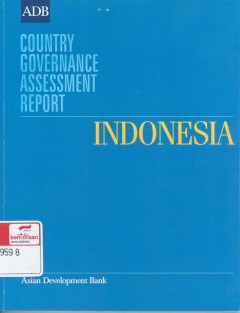Filter by
Found 12368 from your keywords: subject="Action research and s...
Tata kelola pemberdayaan dan partisipasi masyarakat sipil di kampung : modul …
- Edition
- 1st print
- ISBN/ISSN
- -
- Collation
- 61p.; 29,5 cm
- Series Title
- Buku saku modul 5
- Call Number
- 352 MUS t
- Edition
- 1st print
- ISBN/ISSN
- -
- Collation
- 61p.; 29,5 cm
- Series Title
- Buku saku modul 5
- Call Number
- 352 MUS t
Penyusunan peraturan perundangan kampung : modul tata kelola pemerintahan kam…
- Edition
- 1st print
- ISBN/ISSN
- -
- Collation
- 105p.; 29,5 cm
- Series Title
- Buku saku
- Call Number
- 352 MUS p
- Edition
- 1st print
- ISBN/ISSN
- -
- Collation
- 105p.; 29,5 cm
- Series Title
- Buku saku
- Call Number
- 352 MUS p

Country governance assessment report Indonesia
- Edition
- -
- ISBN/ISSN
- -
- Collation
- vii, 125p.; 27 cm
- Series Title
- -
- Call Number
- 320.959 8, ASI, c
- Edition
- -
- ISBN/ISSN
- -
- Collation
- vii, 125p.; 27 cm
- Series Title
- -
- Call Number
- 320.959 8, ASI, c

Tanah masih di langit: penyelesaian masalah penguasaan tanah dan kekayaan ala…
- Edition
- -
- ISBN/ISSN
- 979-97910-5-7
- Collation
- xii, 898p.; 30 cm
- Series Title
- -
- Call Number
- 346.043, YAY, t
- Edition
- -
- ISBN/ISSN
- 979-97910-5-7
- Collation
- xii, 898p.; 30 cm
- Series Title
- -
- Call Number
- 346.043, YAY, t

Kamus lengkap Inggris-Indonesia-Inggris plus idiom
- Edition
- 1st print
- ISBN/ISSN
- 979-782-055-6
- Collation
- 960p.; 25 cm
- Series Title
- -
- Call Number
- R423.992 21, HAR, k
- Edition
- 1st print
- ISBN/ISSN
- 979-782-055-6
- Collation
- 960p.; 25 cm
- Series Title
- -
- Call Number
- R423.992 21, HAR, k

Hak memilih anggota polri dalam pemilihan umum untuk mewujudkan negara Indone…
Dissertation
- Edition
- -
- ISBN/ISSN
- -
- Collation
- xxvi, 396p.; 30 cm
- Series Title
- -
- Call Number
- R363.2 GAU h

Undang-Undang Republik Indonesia Nomor 23 Tahun 2014 tentang Pemerintahan Daerah
- Edition
- -
- ISBN/ISSN
- -
- Collation
- irregular page; 30 cm
- Series Title
- -
- Call Number
- R352 IND u
- Edition
- -
- ISBN/ISSN
- -
- Collation
- irregular page; 30 cm
- Series Title
- -
- Call Number
- R352 IND u

Rancangan peraturan daerah provinsi Papua : tentang pembangunan kampung dan k…
- Edition
- -
- ISBN/ISSN
- -
- Collation
- 40p.; 26 cm
- Series Title
- Terdapat juga di dalamnya naskah akademik: ranccangan peraturan daerah provinsi papua: 84p.
- Call Number
- R342.73 KEM r
- Edition
- -
- ISBN/ISSN
- -
- Collation
- 40p.; 26 cm
- Series Title
- Terdapat juga di dalamnya naskah akademik: ranccangan peraturan daerah provinsi papua: 84p.
- Call Number
- R342.73 KEM r

Undang-undang Republik Indonesia nomor 22 tahun 2004 tentang komisi yudisial
- Edition
- -
- ISBN/ISSN
- -
- Collation
- 32p.; 21 cm
- Series Title
- -
- Call Number
- R347.598, IND, u
- Edition
- -
- ISBN/ISSN
- -
- Collation
- 32p.; 21 cm
- Series Title
- -
- Call Number
- R347.598, IND, u

Peningkatan kualitas pelayanan publik yang bebas korupsi, kolusi dan nepotisme
- Edition
- 1st print
- ISBN/ISSN
- -
- Collation
- viii, 276p.; 21 cm
- Series Title
- -
- Call Number
- R354.598, PEN, p
- Edition
- 1st print
- ISBN/ISSN
- -
- Collation
- viii, 276p.; 21 cm
- Series Title
- -
- Call Number
- R354.598, PEN, p

Peraturan pemerintah Republik Indonesia nomor 72 tahun 2005 tentang desa dan …
- Edition
- -
- ISBN/ISSN
- -
- Collation
- 87p.; 21 cm
- Series Title
- -
- Call Number
- R352, IND, p
- Edition
- -
- ISBN/ISSN
- -
- Collation
- 87p.; 21 cm
- Series Title
- -
- Call Number
- R352, IND, p

Proceeding expert meeting II : program penguatan otonomi desa , budaya lokal …
- Edition
- -
- ISBN/ISSN
- -
- Collation
- ix, 132p.; 18 cm
- Series Title
- -
- Call Number
- 352, UNI, p
- Edition
- -
- ISBN/ISSN
- -
- Collation
- ix, 132p.; 18 cm
- Series Title
- -
- Call Number
- 352, UNI, p

Kamus Inggris-Indonesia: an english-Indonesian dictionary
- Edition
- 25th print
- ISBN/ISSN
- 979-686-452-5
- Collation
- xviii, 660p.; 24 cm
- Series Title
- -
- Call Number
- R423.992 21, ECH, k
- Edition
- 25th print
- ISBN/ISSN
- 979-686-452-5
- Collation
- xviii, 660p.; 24 cm
- Series Title
- -
- Call Number
- R423.992 21, ECH, k

RUU perkebunan : melestarikan eksploitasi dan ketergantungan
- Edition
- -
- ISBN/ISSN
- -
- Collation
- vii, 75p.; 21 cm
- Series Title
- -
- Call Number
- R343.598, RAC, r
- Edition
- -
- ISBN/ISSN
- -
- Collation
- vii, 75p.; 21 cm
- Series Title
- -
- Call Number
- R343.598, RAC, r

Undang-undang komisi yudisial 2004 : UU RI no. 22 tahun 2004 tentang komisi y…
- Edition
- 1st print
- ISBN/ISSN
- 979-3421-81-9
- Collation
- viii, 63p.; 20 cm
- Series Title
- -
- Call Number
- R347, UND, u
- Edition
- 1st print
- ISBN/ISSN
- 979-3421-81-9
- Collation
- viii, 63p.; 20 cm
- Series Title
- -
- Call Number
- R347, UND, u

Komisi Pemberantasan Korupsi republik Indonesia : UU No. 30/2002, UU No. 20/2…
- Edition
- -
- ISBN/ISSN
- -
- Collation
- 126p.; 21 cm
- Series Title
- -
- Call Number
- R364.132 3 IND k
- Edition
- -
- ISBN/ISSN
- -
- Collation
- 126p.; 21 cm
- Series Title
- -
- Call Number
- R364.132 3 IND k

Peran media, ombudsman pers dan hak jawab untuk pelaksanaan otonomi daerah
- Edition
- Seri 2
- ISBN/ISSN
- 979-99483-3-9
- Collation
- xxvi, 128p.; 21 cm
- Series Title
- 2nd series: Healthy press freedom for healthy local autonomy
- Call Number
- R323.44, PAN, p
- Edition
- Seri 2
- ISBN/ISSN
- 979-99483-3-9
- Collation
- xxvi, 128p.; 21 cm
- Series Title
- 2nd series: Healthy press freedom for healthy local autonomy
- Call Number
- R323.44, PAN, p

Kumpulan peraturan tentang pemerintahan desa
Isu otonomi desa, sangat disayangkan tidak menarik banyak pihak untuk dijadikan sebagai bahan dialog dalam konteks otonomi secara keseluruhan jika dibandingkan dengan isu pembagian kekuasaan dan kewenangan, bagi-bagi keuangan antara pusat dan daerah. Begitu banyak instrumen hukum yang dikeluarkan oleh negara baik dari tingkat pusat sampai daerah, tetapi dalam tataran sosialisasinya sangat terti…
- Edition
- -
- ISBN/ISSN
- -
- Collation
- iv, 420p.; 21 cm
- Series Title
- -
- Call Number
- R342.73, ARI, k

Kumpulan peraturan daerah kota Semarang tentang pedagang kaki lima (PKL)
- Edition
- 1st print
- ISBN/ISSN
- 979-97177-3-6
- Collation
- vii, 74p.; 18 cm
- Series Title
- -
- Call Number
- R658.85, TIM, k
- Edition
- 1st print
- ISBN/ISSN
- 979-97177-3-6
- Collation
- vii, 74p.; 18 cm
- Series Title
- -
- Call Number
- R658.85, TIM, k

Undang-undang Republik Indonesia nomor 11 tahun 2006 tentang pemerintahan Aceh
- Edition
- -
- ISBN/ISSN
- -
- Collation
- iv, 287p.; 21 cm
- Series Title
- -
- Call Number
- R352, IND, u
- Edition
- -
- ISBN/ISSN
- -
- Collation
- iv, 287p.; 21 cm
- Series Title
- -
- Call Number
- R352, IND, u
 Computer Science, Information & General Works
Computer Science, Information & General Works  Philosophy & Psychology
Philosophy & Psychology  Religion
Religion  Social Sciences
Social Sciences  Language
Language  Pure Science
Pure Science  Applied Sciences
Applied Sciences  Art & Recreation
Art & Recreation  Literature
Literature  History & Geography
History & Geography